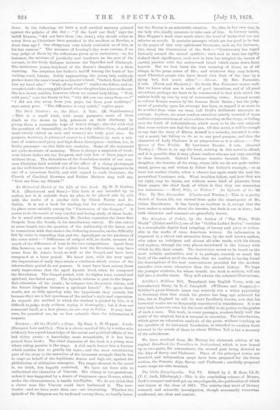An Historical Sketch of the Life of Our Lord. By
W. T. Gordon, M.A, (Blackwood and Sons.)—This book is not intended by its author, nor is it suitable from its plan, to be placed side by side with the works of a similar title by Canon Farrar and Dr. Geikie. It is not a book for reading, but for reference, and takes its place more suitably among the "Harmonies of the Gospels." It scorns to be the result of very careful and loving study of those books. As is usual with commentators, Mr. Gordon separates the three first Gospels from the fourth, in his introductory survey. Ho also enters at some length into the question of tho authorship of the latter, and in connection with that makes the following remarks, on the difficulty felt by some in regarding that and the Apocalypse as the products of the same mind :—" Difference of subject will, no doubt, account for much of the difference of tone in the two compositions. Apart from this, however, we can so far explain how the Revelation may have come from St. John's hand, as well as the Gospel, and have been composed at a later period. We know how, with the very aged, the impressions of early days retain a vividness which scenes of the intermediate period do not possess. It must have been among those early impressions that the aged Apostle lived, when he composed the Revelation. Tho Gospel period, with its higher tone, mental and spiritual, has faded away. The Apostle returns in part to the imper- fect education of his youth ; he relapses into theocratio visions, and the future kingdom becomes a spiritual Israel." We quote those words, not as fully agreeing with the hypothesis they contain, but because they are a fair specimen of the author's style and expression. As regards the method in which the student is guided by him, it is difficult to judge, truly without trying it thoroughly; but it does not commend itself, at a first glance, as one easy to follow. It may, how- ever, for practical use, be no less valuable than the information it imparts.


































 Previous page
Previous page